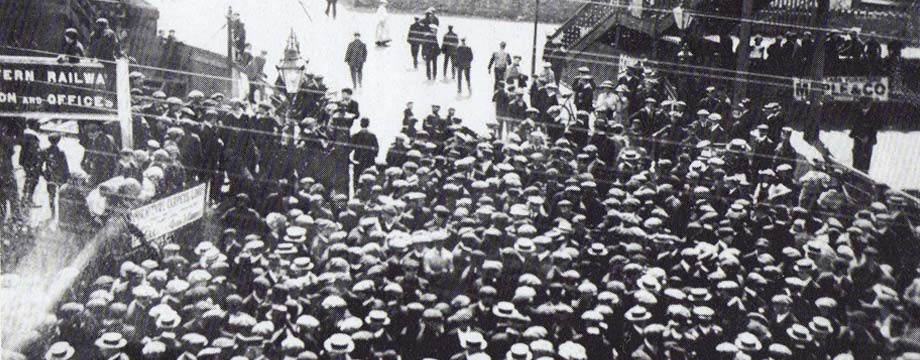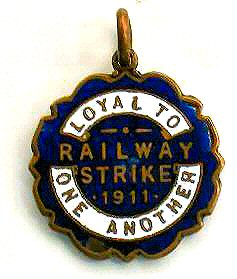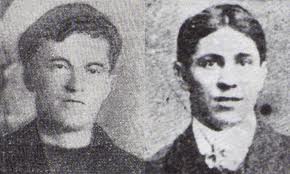
Recently Rated:
Stats
Army kills innocent protesters in South Wales
 One hundred years ago this week an event ocurred in Llanelli, South Wales that shocked the nation. The first ever national rail strike had been called after a long period of industrial unrest particularly in Liverpool where two strikers had been shot dead by an an army officer during attacks on police vans taking convicted rioters to Walton jail. The army and local police, reinforced by a number of brutal police officers from Birmingham had fought several battles with strikers, all under the watchful eye of, and approved by, Home secretary Winston Churchill. This period of unrest culminating in August 1911 was described by the historian Eric Taplin as the nearest occasion that Britain has come to a revolution. The wave of strikes in Britain between 1910 and 1914 saw millions of workers fight over wages and conditions. This period of sustained industrial rebellion in British working class history became known as the Great Unrest.
One hundred years ago this week an event ocurred in Llanelli, South Wales that shocked the nation. The first ever national rail strike had been called after a long period of industrial unrest particularly in Liverpool where two strikers had been shot dead by an an army officer during attacks on police vans taking convicted rioters to Walton jail. The army and local police, reinforced by a number of brutal police officers from Birmingham had fought several battles with strikers, all under the watchful eye of, and approved by, Home secretary Winston Churchill. This period of unrest culminating in August 1911 was described by the historian Eric Taplin as the nearest occasion that Britain has come to a revolution. The wave of strikes in Britain between 1910 and 1914 saw millions of workers fight over wages and conditions. This period of sustained industrial rebellion in British working class history became known as the Great Unrest.
 There were plenty of reasons for rail workers to strike. Prices of basic goods were rising sharply and wages were stagnant or falling. A third of railway workers were paid less than 20 shillings a week. In Llanelli, large crowds of picketers halted rail traffic. Local magistrates had requested the help of the army and soldiers were drafted in as other industrial workers came onto the streets in solidarity, joining crowds of people from the railway and dockside communities. On Saturday 19 August 1911, as strikers attempted physically to prevent a train passing through, soldiers of the Worcester Regiment opened fire, killing two men and wounding others.
There were plenty of reasons for rail workers to strike. Prices of basic goods were rising sharply and wages were stagnant or falling. A third of railway workers were paid less than 20 shillings a week. In Llanelli, large crowds of picketers halted rail traffic. Local magistrates had requested the help of the army and soldiers were drafted in as other industrial workers came onto the streets in solidarity, joining crowds of people from the railway and dockside communities. On Saturday 19 August 1911, as strikers attempted physically to prevent a train passing through, soldiers of the Worcester Regiment opened fire, killing two men and wounding others.
There were subsequent riots and, sadly as was the case last week, looting took place. The shops of the magistrates who brought in the troops were stormed and comprehensively looted. Battles took place with soldiers who tried to clear the streets at bayonet-point. Many protesters received bayonet and baton wounds, avoiding hospital for fear of arrest.
Significantly, at the height the battles the soldiers stood back and refused to engage, at one point penned in the railway station while crowds attacked it, smashing all the windows. For hours the authorities seemed paralysed, unable or unwilling to intervene as the trucks and sidings of the Great Western Railway Company were assailed, looted and burned, triggering an explosion which killed another four people. One soldier refused to fire on the crowd, was arrested, escaped from military custody and went on the run, raising the authorities fears of a wider mutiny.
 Its important to remember the people who died in these incidents. At Llanelli, ironically neither of the men who were killed were railway workers or even directly involved. Jac John was a tinplate worker, shot as he stood in the garden of No 6 High Street, overlooking the railway line. The other man Leonard Worsell was shot in his own back garden, whilst in the midst of shaving.
Its important to remember the people who died in these incidents. At Llanelli, ironically neither of the men who were killed were railway workers or even directly involved. Jac John was a tinplate worker, shot as he stood in the garden of No 6 High Street, overlooking the railway line. The other man Leonard Worsell was shot in his own back garden, whilst in the midst of shaving.
The lesson of Llanelli must stay in our minds. It is almost unthinkable that the authorities would consider ordering British troops to fire on their fellow unarmed British subjects. Last week the knee jerk reaction of many people who saw crowds of rioters outnumbering beleaguered police was Call in the army! Even in some of the Middle East countries, notably Egypt, the military refused to fire on protesters. It was heartening to hear about unprecedented assistance of police with information following our recent riots. We must oppose any move to introduce draconian measures that would undermine our successful model of policing by consensus.

The Llanelli Riots were badly handled and it was said that a local JP, Thomas Jones, a shareholder in the GWR, sent a telegram calling for the assistance of the miltary. Interestingly, it was the shops of the magistrates that were targeted in the ensuing riots. John Edwards, local historian, says in his book 'Remembrance of a Riot' that in later years the local Chapel discouragedtalk of the Riots. They probably did not want to encourage a recurrence.
This is also the event that made "Sosban Fach" the Llanelli battle hymn. The war cry for the protesters and the Rugby rallying song of today. I wrote about it here.
http://iantopf.hubpages.com/hub/Sosban-Fach